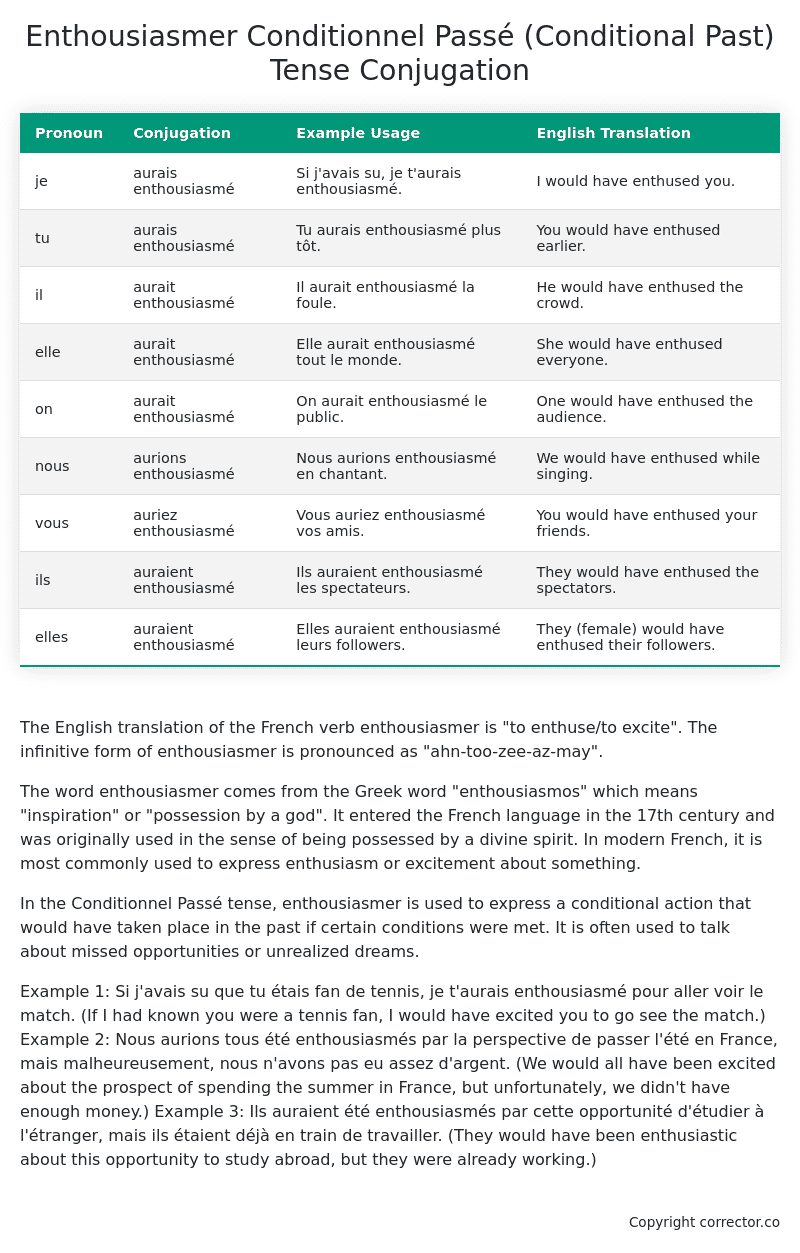Conditionnel Passé (Conditional Past) Tense Conjugation of the French Verb enthousiasmer
Introduction to the verb enthousiasmer
The English translation of the French verb enthousiasmer is “to enthuse/to excite”. The infinitive form of enthousiasmer is pronounced as “ahn-too-zee-az-may”.
The word enthousiasmer comes from the Greek word “enthousiasmos” which means “inspiration” or “possession by a god”. It entered the French language in the 17th century and was originally used in the sense of being possessed by a divine spirit. In modern French, it is most commonly used to express enthusiasm or excitement about something.
In the Conditionnel Passé tense, enthousiasmer is used to express a conditional action that would have taken place in the past if certain conditions were met. It is often used to talk about missed opportunities or unrealized dreams.
Example 1: Si j’avais su que tu étais fan de tennis, je t’aurais enthousiasmé pour aller voir le match. (If I had known you were a tennis fan, I would have excited you to go see the match.)
Example 2: Nous aurions tous été enthousiasmés par la perspective de passer l’été en France, mais malheureusement, nous n’avons pas eu assez d’argent. (We would all have been excited about the prospect of spending the summer in France, but unfortunately, we didn’t have enough money.)
Example 3: Ils auraient été enthousiasmés par cette opportunité d’étudier à l’étranger, mais ils étaient déjà en train de travailler. (They would have been enthusiastic about this opportunity to study abroad, but they were already working.)
Table of the Conditionnel Passé (Conditional Past) Tense Conjugation of enthousiasmer
| Pronoun | Conjugation | Example Usage | English Translation |
|---|---|---|---|
| je | aurais enthousiasmé | Si j’avais su, je t’aurais enthousiasmé. | I would have enthused you. |
| tu | aurais enthousiasmé | Tu aurais enthousiasmé plus tôt. | You would have enthused earlier. |
| il | aurait enthousiasmé | Il aurait enthousiasmé la foule. | He would have enthused the crowd. |
| elle | aurait enthousiasmé | Elle aurait enthousiasmé tout le monde. | She would have enthused everyone. |
| on | aurait enthousiasmé | On aurait enthousiasmé le public. | One would have enthused the audience. |
| nous | aurions enthousiasmé | Nous aurions enthousiasmé en chantant. | We would have enthused while singing. |
| vous | auriez enthousiasmé | Vous auriez enthousiasmé vos amis. | You would have enthused your friends. |
| ils | auraient enthousiasmé | Ils auraient enthousiasmé les spectateurs. | They would have enthused the spectators. |
| elles | auraient enthousiasmé | Elles auraient enthousiasmé leurs followers. | They (female) would have enthused their followers. |
Other Conjugations for Enthousiasmer.
Le Present (Present Tense) Conjugation of the French Verb enthousiasmer
Imparfait (Imperfect) Tense Conjugation of the French Verb enthousiasmer
Passé Simple (Simple Past) Tense Conjugation of the French Verb enthousiasmer
Passé Composé (Present Perfect) Tense Conjugation of the French Verb enthousiasmer
Futur Simple (Simple Future) Tense Conjugation of the French Verb enthousiasmer
Futur Proche (Near Future) Tense Conjugation of the French Verb enthousiasmer
Plus-que-parfait (Pluperfect) Tense Conjugation of the French Verb enthousiasmer
Passé Antérieur (Past Anterior) Tense Conjugation of the French Verb enthousiasmer
Futur Antérieur (Future Anterior) Tense Conjugation of the French Verb enthousiasmer
Subjonctif Présent (Subjunctive Present) Tense Conjugation of the French Verb enthousiasmer
Subjonctif Passé (Subjunctive Past) Tense Conjugation of the French Verb enthousiasmer
Subjonctif Imparfait (Subjunctive Imperfect) Tense Conjugation of the French Verb enthousiasmer
Conditionnel Présent (Conditional Present) Tense Conjugation of the French Verb enthousiasmer
Conditionnel Passé (Conditional Past) Tense Conjugation of the French Verb enthousiasmer (this article)
L’impératif Présent (Imperative Present) Tense Conjugation of the French Verb enthousiasmer
L’infinitif Présent (Infinitive Present) Tense Conjugation of the French Verb enthousiasmer
Struggling with French verbs or the language in general? Why not use our free French Grammar Checker – no registration required!
Get a FREE Download Study Sheet of this Conjugation 🔥
Simply right click the image below, click “save image” and get your free reference for the enthousiasmer Conditionnel Passé tense conjugation!

Enthousiasmer – About the French Conditionnel Passé (Conditional Past) Tense
Formation
Common Everyday Usage Patterns
Expressing Unreal Past Scenarios
Polite Requests or Suggestions
Expressing Doubt or Uncertainty
Interactions with Other Tenses
Conditional Present
Indicative Past Tenses
Conditional Future
Summary
Want More?
I hope you enjoyed this article on the verb enthousiasmer. Still in a learning mood? Check out another TOTALLY random French verb conjugation!


